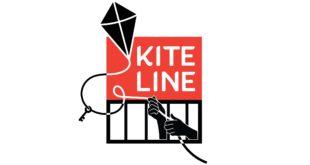For our first episode of the new year, we wanted to begin sharing an interview with Leon Benson. In this conversation, he covers his release from prison, reflections on the treatment he received from the authorities, and his work on the outside. This is a special privilege for Kite Line, since we have aired Benson’s work and thought many times …
Read More »Tag Archives: policing
April 2023: Brown Water Utopia
In this episode of Partisan Gardens, we explore the competing utopias at stake in the struggle to stop Cop City in Atlanta. Cop City is itself a grim utopia, a vision concocted by cops and politicians of a depopulated, fake city that will actually bend to their will. On the other side are the diverse utopian dreams of the movement …
Read More »April 14, 2023: A History of Sexual Policing
This week, we share the final part of a conversation about policing sex. Micol Seigel talks to Anne Gray Fischer about her book, The Streets Belong to Us: Sex, Race, and Police Power from Segregation to Gentrification. Today, their focus turns to Boston and Atlanta, discussing Boston’s vice district, known as the Combat Zone, and how the police used this …
Read More »April 7, 2023: The Rising Chorus Against Cop City
First, we have our monthly round up of prison disturbances, as compiled by Perilous Chronicle. Afterwards, Angela Davis shares a statement in support of the Stop Cop City movement. And we finish sharing a panel hosted by Haymarket Books on the abolitionist struggle to Stop Cop City. In this section, we hear organizer Kwame Olufemi of Community Movement Builders and …
Read More »February 17, 2023: Policing Sex
This we continue our conversation between Micol Seigel and Anne Gray Fischer about her recent book, The Streets Belong to Us: Sex, Race, and Police Power from Segregation to Gentrification, an account of gender and sexuality’s crucial role in the history and exercise of police power. [ Here are our previous episodes ] with Anne Gray Fischer on the book
Read More »February 3, 2022: Rikers is Deadlier Than Ever
Today’s episode highlights the campaign to close Rikers jail in New York and continues our conversation with Anne Gray Fischer about the intertwined stories of policing, the surveillance of women’s bodies, and the creation of the racialized American ghetto. Both Sy, an organizer against Rikers, and Gray Fischer, extend the histories of control and racial domination back to the middle …
Read More »January 13, 2023: Sex Work at the Birth of the Ghetto
We are pleased to continue sharing a conversation between Micol Seigel and Anne Gray Fischer. Fischer’s powerful book, The Streets Belong to Us: Sex, Race, and Police Power from Segregation to Gentrification, was published in 2022, and is an account of gender and sexuality’s crucial role in the history and exercise of police power. In this conversation, Fischer and Seigel discuss …
Read More »January 6, 2023: Policing Womens’ Bodies
We are pleased to share the first part of an interview between Anne Gray Fischer and Micol Siegel. Fischer’s powerful first book, The Streets Belong to Us: Sex, Race, and Police Power from Segregation to Gentrification, was published earlier in 2022, and is an account of gender and sexuality’s crucial role in the history and exercise of police power. In this …
Read More »March 26, 2021: The Struggle for the Eurma C Hayes, Part Two
Our show this week returns with the second part of a conversation between Kite Line’s Micol Seigel and three members of the Carbondale, Illinois community: Chastity, Kim, and Nick. They speak about the ongoing struggle for the use of the Eurma C Hayes Community center. Originally opened by the city as a space for youth, the city later defunded the …
Read More »Interchange – Violence Work: On Policing with Micol Seigel
This is a repeat airing of an October 9, 2018 live interview with Micol Seigel. *** In Violence Work, Micol Seigel shows how the police put violence to work for the state; policing being the quintessential translation of state power. She highlights a number of fallacies or myths, about policing: that it is civilian and distinguishable from the military; that it …
Read More » WFHB Bloomington Community Radio
WFHB Bloomington Community Radio


